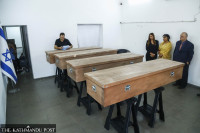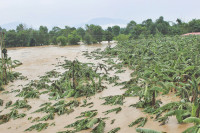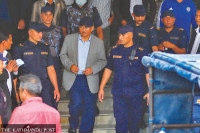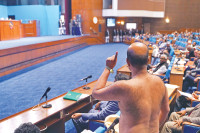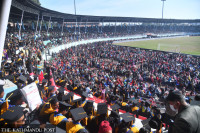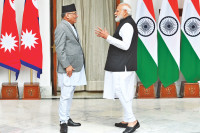Special Supplement
Prachanda puts down the gun and embraces power
‘In 10 years, Nepal will develop from an extremely poor country with a per capita GDP of less than $300 to the richest country in South Asia with a per capita GDP of $3,000,’ said the Maoist chairman.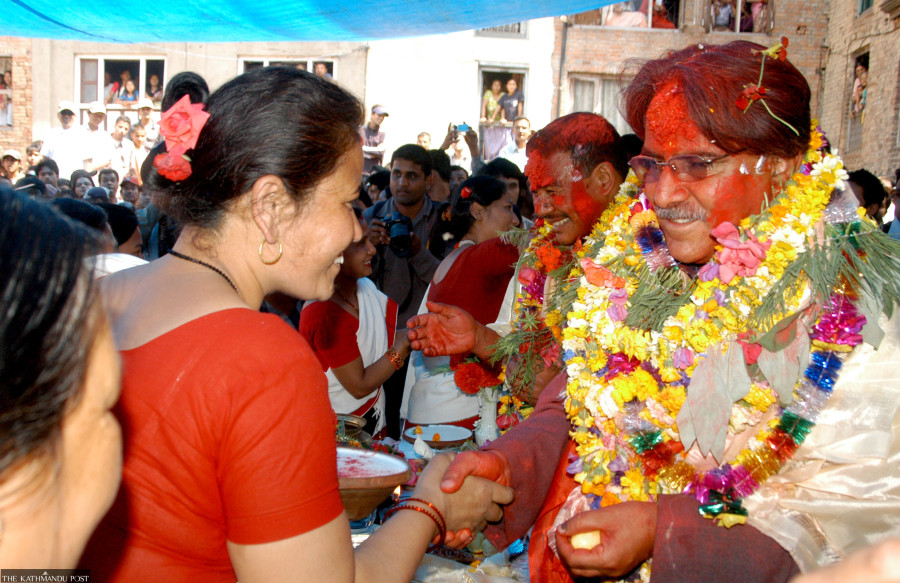
Context: This interview was held a few weeks after Constituent Assembly elections on April 10, 2008 when Prachanda’s party became the biggest elected force in Nepal. Prachanda went on to be elected prime minister in August 2008.
China Daily Website Global Online News: After winning the Nepal Constituent Assembly election, the chairman of the Communist Party of Nepal (Maoist) Prachanda has been busier. When reporters met him last year, he was still living in a motel in the capital Kathmandu, but has now moved into a rented residence. Our interview had only been going on for 10 minutes when an assistant came in and said that the UNDP official was waiting in another room. Prachanda hesitated, then asked the reporter apologetically, "Can you come back at 6:30 am tomorrow morning?"
Interview at 6:30 AM
Early the next morning, the reporter arrived at Prachanda's residence on time, and was surprised to find that his reception room was already crowded with Nepali people, and Prachanda was cordially talking to them. After finally seeing off the last guest, Prachanda hurriedly asked the reporter to sit down: "These are the folks from the tenth constituency of Kathmandu. I want to meet these ordinary people and let them take the promises made by the CPN (Maoist) to the voters to their respective hometowns. Looking at the busy Prachanda, the reporter remembered a sentence circulating among Nepali voters: "In Nepal, anyone can shake hands with Prachanda."
Prachanda has changed much this year. Before 2007, he carried a gun in the mountains and forests for a decade of anti-government struggles. But in just one year, he laid down his arms and came to the capital, building a deep bond with voters.
I remember a day before the general election, a voter in Kathmandu's second constituency and chairman of the Araniko Society, Harish, told reporters that he had decided to "betray": "In the past, I have always supported the Communist Party of Nepal (United Marxist-Leninist), but this time, I will vote for the Communist Party of Nepal (Maoist).”
The reporter couldn't help but ask the reason, and Harish replied: "Mr. reporter, do you know? A CPN (Maoist) candidate moved to this constituency from out of town only last year. But in the past six months, this candidate has visited more than 10,000 households in the constituency, and I have shaken hands with this candidate three times. But what about candidates from other political parties? None of them appeared at the door of the common people. Prachanda has no ego. One day, he went on from 8 am to 6 pm. Wherever he went, many women offered him flowers. We all believe that the CPN (Maoist) is sincere for the common people."
In the vast countryside, Prachanda's other magic weapon to win people's hearts is the Young Communist League.
After the "Comprehensive Peace Agreement" was signed with the Nepali government in January 2007, Prachanda used 35,000 soldiers from the Communist Party of Nepal (Maoist) who were stationed in the country's military camps to form another mass team, and named it the Young Communist League. This team helped farmers build roads, harvest food, and dig wells in impoverished rural areas. It is very popular with ordinary people and has grown to 300,000 members.
A villager in a remote mountainous area said excitedly: "All this time, whether it is the king or any other party, it has only dealt with people in the big cities of Kathmandu, and never with the poor, women, untouchables. But the Young Communist League and the Communist Party of Nepal (Maoist) did this. Based on this, I will definitely choose them."
‘I really envy China's treatment of the last emperor’
Thanks to the support of the "hardcore people", the Nepal Constituent Assembly election on April 10 became the stage where Prachanda stood out. There were more than 20 political parties competing for 240 directly elected seats, of which the Communist Party of Nepal (Maoist) won 120, becoming the largest party. In Kathmandu’s constituency, Prachanda, who fought in person, received twice as many votes as the second-place candidate. The 62 observers sent by the international community to Nepal to monitor the electoral process had to exclaim: "Prachanda has become the biggest winner of this election."
Faced with this outcome, none is more disturbed than King Gyanendra of Nepal, because Prachanda has publicly stated that he wants to abolish the monarchy: "The king should seize this historic opportunity to show his love for his people and his country, and voluntarily leave the palace as soon as possible."
The reporter asked curiously, "Why are you against Gyanendra?"
Prachanda said calmly: "I have never met King Gyanendra in my life. We have not had any personal celebrations, and my opposition to the monarchy is entirely due to dissatisfaction with this social system. The king is very rich, and the CPN (Maoist) does not object to doing business or politics in the future. If Gyanendra is interested, he can even form a party to run for the future president of Nepal."
"Indian newspapers say that King Gyanendra intends to move to Rajasthan, India, because his daughter-in-law Himani came from a noble family in the state. Have you heard of it?" the reporter asked.
Prachanda shook his head: "Gyanendra doesn't have to move to India, Nepal is his home after all. If necessary, I can personally meet King Gyanendra and persuade him. The people of Nepal will forgive him for what he has done. Historically, the process of abolishing kings has been brutal, sometimes with beheadings, sometimes with the need to travel far away, and the CPN (Maoist) wants to avoid a repeat of this."
Speaking of this, Prachanda's eyes suddenly lit up and he said to the reporter: "I am very envious of China's treatment of the last emperor Puyi. If Gyanendra becomes like Puyi, from a king to a commoner, won’t it be a blessing for the Nepali people?"
It seems that Prachanda's victory will inevitably bring unprecedented changes to the country deep in the Himalayas—Nepal will officially end the 240-year-old Shah dynasty.
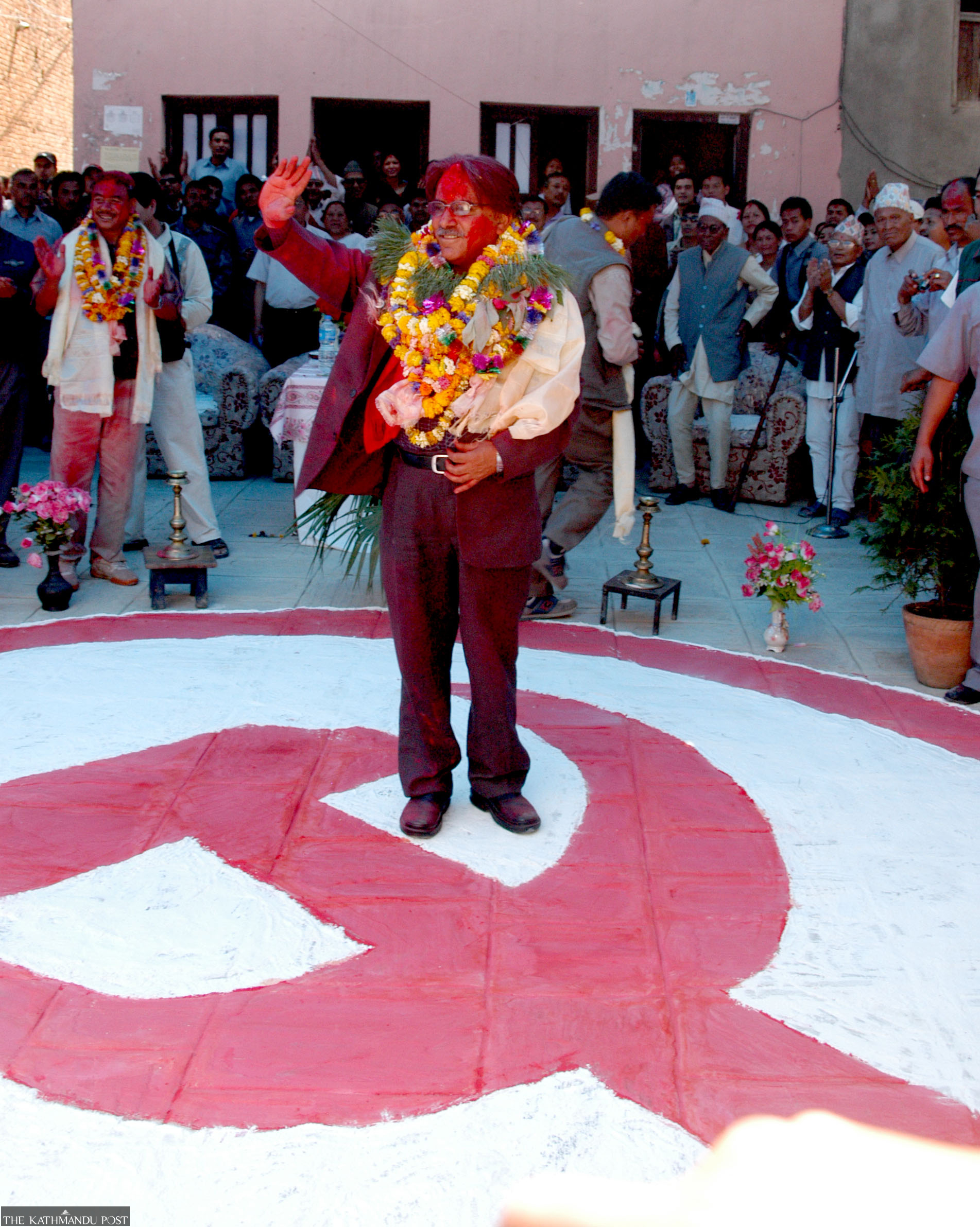
‘Switzerland of Asia’
Prachanda, 54, attaches great importance to China's development. The reporter brought him some T-shirts with Mao Zedong's portrait from China. He wore these T-shirts and gave them to other important leaders in the party. At the end of last year, Prachanda asked reporters for the English version of the report of the 17th National Congress of the Communist Party of China. He said the experience of Big Brother China is very important for the CPN (Maoist). Usually, Prachanda likes to watch the news of China Central Television's English channel very much.
Prachanda's vision for the public is that Nepal will become a transit point for trade between China and India, with rapid economic growth driven by tourism, hydropower and other industries. "In 10 years, Nepal will develop from an extremely poor country with a per capita GDP of less than $300 to the richest country in South Asia with a per capita GDP of $3,000," he said. Prachanda confidently declared that Nepal will be the "Switzerland of Asia" in the future—a small picturesque country, a paradise for living and working in peace and contentment.
For this dream, Prachanda “gave up his armor and went home”, and said with pride that he would be the first president of Nepal.
‘I'm not a romantic person’
There is nothing luxurious about the house that Prachanda is renting, and it is not as good as the residential building provided to ministers by the Nepali government. Outside the door, there were two police cars and a dozen police officers, but the police did not check passers-by. Entering the door, in the courtyard of a three-story building, a small post box was built, and a fully armed soldier was standing guard. It is said to be a three-story building, but in fact, only the third floor is the residence of the Prachanda family, and the first and second floors are his reception area and office area. This interview was conducted in the office on the second floor. Apart from a circle of sofas and a map of Nepal, there is no other furniture.
The reporter was given a "special permission" to go upstairs to visit Prachanda's bedroom and study. In the bedroom, there were no appliances other than a regular TV that was always playing the news. The most striking feature was a wall-high bookshelf filled with theoretical and historical books in both Nepali and English. The leaders of the Communist Party of Nepal (Maoist) have all been familiar with the works of Marxism-Leninism and Mao Zedong Thought, and Prachanda is no exception. In order to communicate with foreigners like us, Prachanda studied English hard, and it is said that he hired a foreign language teacher for a while. The reporter and Prachanda have known each other for nearly two years, and feel that his English level is improving.
As the supreme leader of the Communist Party of Nepal (Maoist), Prachanda has not had a private life since he launched the armed struggle in February 1996. An assistant and two bodyguards follow him 24 hours a day, and dozens of people are busy around him at any time, which has become Prachanda's way of life.
Prachanda's father had a little land and property in his hometown of Chitwan, but Prachanda rarely had a chance to return home. Prachanda's wife is an extremely ordinary Nepali woman who speaks no English, is reticent, and never participates in any public events. Usually, she helps Prachanda organise clothes and takes care of his life. For more than ten years, the two have gone through a hail of bullets and political storms, but they have never been separated. Prachanda said with a smile: "I'm not a romantic person, and my wife is also an ordinary person who is not very remarkable looking, but we can stick together…"
During the interview, the reporter also met Prachanda's son, Prakash, a shy young man who had just been appointed as his father's special assistant to help him handle emails and draft speeches. He said shyly that he had been to Beijing, Shanghai and Shaoshan, Hunan in China. But what moved him the most was the visit to the former residence of Mao Zedong, which made his years-long dream come true.
When talking about China's modern urban architecture, his eyes sparkled with yearning light: "One day, I hope that Nepal can also appear as a modern metropolis like Shanghai."
Translated by Raunab Singh Khatri and Aneka Rebecca Rajbhandari for The Araniko Project.
This is an edited version of an interview originally published by Global People magazine on May 27, 2008 and was re-shared by China Daily. The name of the interviewer is not mentioned.




 17.12°C Kathmandu
17.12°C Kathmandu